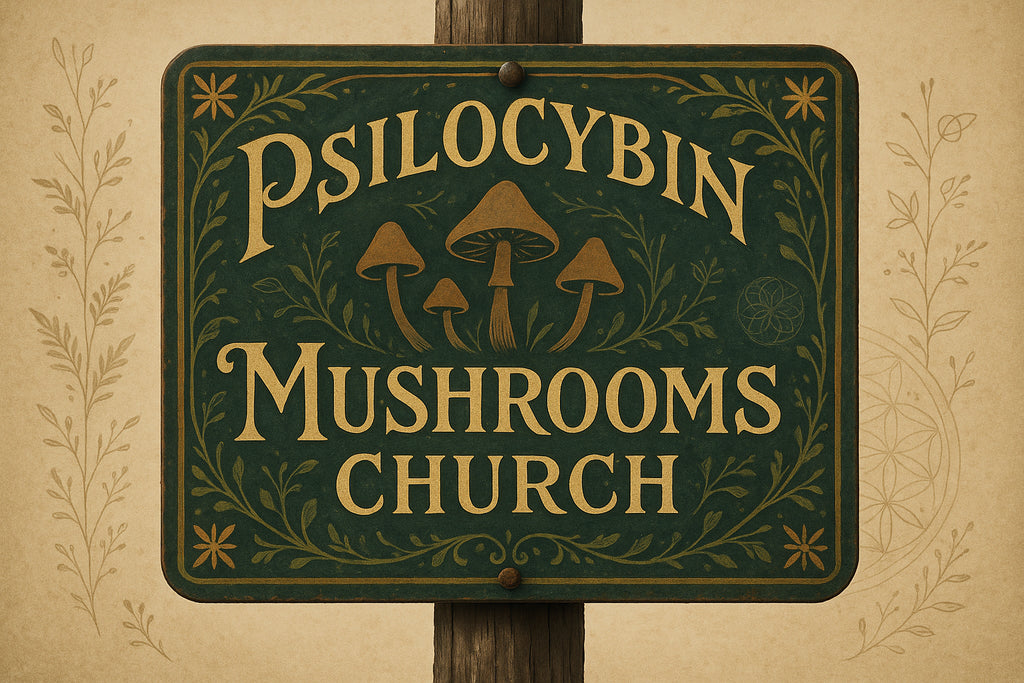The Sacred Spore: How Psilocybin Churches are Nurturing Community and Healing in the Bay Area
Posted by SOUFIANE MESKINE

The Bay Area has long been a crucible of counterculture, technological innovation, and spiritual exploration. From the Beat poets of North Beach to the Summer of Love in Haight-Ashbury, this region has consistently pushed the boundaries of consciousness and community. Today, a new—yet ancient—chapter is being written: the rise of psilocybin churches and ministries. These are not clandestine gatherings, but intentional, legally protected religious communities dedicated to the sacramental use of psilocybin mushrooms.
Far from the recreational stereotype, these churches are providing a structured, safe, and sacred framework for experiences that offer profound benefits for individuals and the broader Bay Area community. Here’s how.
1. Providing Safe, Guided, and Legal (Religiously Protected) Access
The underground market for psychedelics carries significant risks, from variable potency and unknown sources to the legal peril of possession. Psilocybin churches operating under state and federal religious freedom laws (like the Religious Freedom Restoration Act - RFRA) provide a critical alternative.
-
Set and Setting: These churches meticulously curate the "set and setting"—the mindset and physical environment—which is crucial for a positive and therapeutic experience. Sessions are held in calm, safe spaces, often guided by trained facilitators who ensure physical and emotional safety.
-
Sacramental Integrity: The mushrooms are sourced and cultivated with intention and reverence, ensuring purity and correct dosage, removing the dangers associated with an unregulated market.
2. Fostering Mental Health and Emotional Wellbeing
The Bay Area, for all its prosperity, is not immune to the modern mental health crisis. Rates of anxiety, depression, PTSD, and existential distress are high. Clinical research from institutions like Johns Hopkins and UCSF has consistently shown that psilocybin offers breakthrough potential in treating these conditions.
-
Breaking Negative Patterns: Psilocybin can facilitate a "reset" of neural pathways, allowing individuals to break free from cycles of rumination and negative thought patterns associated with depression and anxiety.
-
Psychedelic-Assisted Therapy: Within a church framework, the sacramental journey can serve a similar purpose to clinical therapy. It allows individuals to confront past trauma, process grief, and gain profound insights into their behaviors and relationships in a supported environment.
-
Spiritual Bypassing Prevention: Responsible churches often integrate preparation and "integration" sessions. This means community members help each other process their experiences and apply the insights to their daily lives, preventing spiritual bypassing where the experience isn't grounded in real-world change.
3. Building Authentic Community and Combating Loneliness
In an age of digital connection and urban isolation, many in the Bay Area suffer from a deep lack of community. Psilocybin churches are, at their heart, communities first.
-
Shared Vulnerability: A shared sacred experience creates powerful bonds. Participating in ceremony fosters a level of empathy, understanding, and connection that is rare in modern society.
-
Ongoing Support: These churches are not just about the ceremony itself. They are ongoing communities that offer group discussions, shared meals, volunteer opportunities, and mutual support, creating a genuine tribe for their members.
-
Inclusivity: Many churches actively work to create inclusive spaces for people of all backgrounds, races, and sexual orientations who are seeking healing and connection.
4. Reconnecting with Nature and the Self
The Bay Area is nestled in one of the most beautiful natural landscapes on earth. Psilocybin is renowned for fostering a deep sense of interconnectedness with nature and the universe.
-
Ecological Awareness: A common experience is the dissolution of ego boundaries and a feeling of being one with nature. This can inspire a more profound environmental ethic and a commitment to stewardship of the beautiful California environment.
-
Personal Insight: In a region driven by ambition and external success, psilocybin can facilitate a journey inward. It allows individuals to ask fundamental questions: "Who am I beyond my job title?" "What is my purpose?" This can lead to greater life satisfaction and reduced materialistic striving.
5. Honoring Indigenous Traditions and Ethical Use
The Bay Area is built on Ohlone land and has a responsibility to honor indigenous wisdom. Modern psilocybin churches often draw inspiration from ancient entheogenic traditions practiced by indigenous cultures for millennia.
-
Cultural Respect: Responsible churches educate their members on the history of these substances, giving respect and credit to the indigenous roots of these practices, moving away from appropriation and towards appreciation.
-
Reverence over Recreation: By framing psilocybin as a sacrament, the church model reinforces a ethos of reverence, intention, and respect, countering a culture of casual misuse and aligning with its traditional use for healing and vision.
Conclusion: A Return to the Sacred
The emergence of psilocybin churches in the Bay Area is not a trend; it is a return. It is a return to community-based healing, to sacred ritual, and to exploring the deepest questions of human existence in a supported setting. By providing safety, fostering mental health, building authentic connection, and inspiring a renewed relationship with nature and the self, these spiritual communities are addressing some of the most pressing needs of our time. They represent a beautiful synthesis of the Bay Area's pioneering spirit and humanity's ancient quest for meaning, offering a promising path toward collective healing and wholeness.
Disclaimer: This article is for informational purposes only and does not constitute medical or legal advice. The use of psilocybin is still illegal under federal law and California state law outside of specific religious exemptions. Individuals should always conduct their own research and consult with legal and health professionals.
